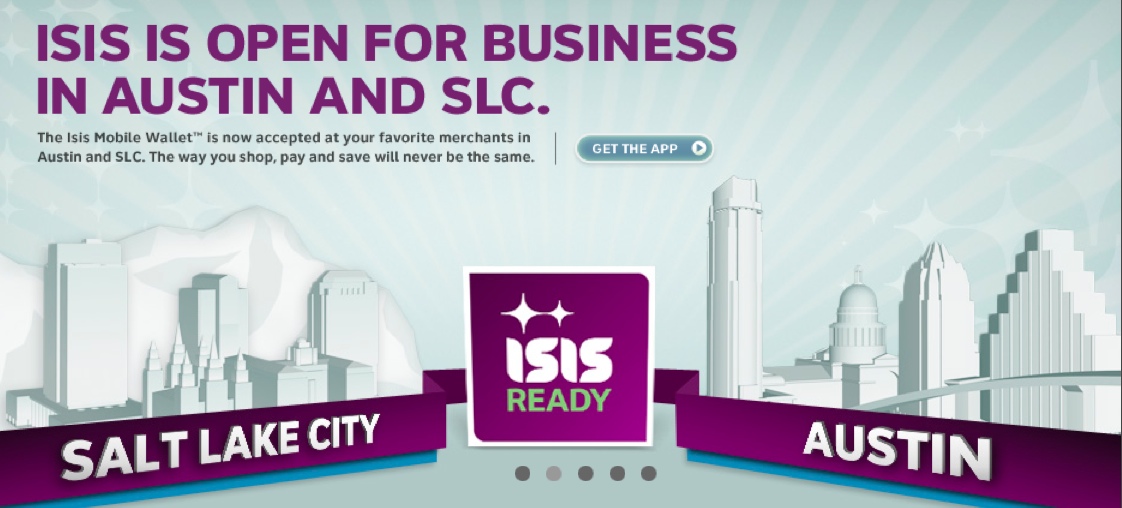The Isis joint venture continues to gear up for a nationwide launch of its NFC-enabled Isis Mobile Wallet this year and has been in discussions with major U.S. banks along with merchants, NFC Times has learned.
The three telcos that make up the venture, Verizon Wireless, AT&T Mobility and T-Mobile USA, have been targeting the start of a commercial launch for this summer, but it could be delayed until the fall, perhaps the beginning of the fourth quarter, said sources.
A number of sources tell NFC Times that Isis has not yet set a specific date for the launch, though the expansion plans are not in doubt, with one or more telcos recently reaffirming the launch plans.
“It’s more of a question of when,” said an Isis source. “The question of ‘if’ has been decided.”
That is despite lackluster results so far for its two-city trial in terms of consumer take-up. Isis declines to release transaction figures for its Isis Mobile Wallet, but use is said to be growing only slowly or “gradually,” as one merchant put it to NFC Times.
That is notwithstanding heavy promotion by the well-funded joint venture and its member telcos in the two cities.
But the pilot has demonstrated that the system works and apparently that it can scale, said sources.
As expected, Isis is not commenting on the expansion plans or releasing results of the pilot.
But sources told NFC Times the three mobile operators have been ordering NFC SIM cards or are planning to do so in significant quantities, much more than they need for the two cities. And the telcos together have certified more than 30 NFC phones to work with the Isis SIMs, including the Samsung Galaxy S4.
Some models are counted more than once in that figure, when more than one of the Isis telcos has certified it. But total models exceed 20, including major Android handsets from LG Electronics, Sony, HTC, Motorola and Pantech, in addition to those from Samsung.
The Isis telcos are believed to be working on bringing in BlackBerry 10 devices, along with the long-anticipated iPhone case, for the iPhone 5, and perhaps for the iPhone 4 and 4S, as well. Isis would need new wallet apps for both the BlackBerry and iOS platforms, and those are believed to be under development.
As NFC Times has reported, a new Android app is also under development, with Isis hoping to bring a cleaner, brighter, slicker user interface to the second version of the wallet. App developer Mutual Mobile is working on the new user interface, while wallet vendor C-SAM will continue to provide the wallet platform. The new Android user interface is expected to be ready by the third quarter.
Rollout Plans Sketchy
It remains to be seen how Isis would carry out the national launch. Most sources expect it to distribute the NFC SIMs and phones to shops nationwide to seed the expansion, but to gradually expand its consumer promotion to more and more cities. Among the factors in choosing the first cities will be those where Isis believes there is an adequate base of contactless point-of-sale terminals.
In the U.S., contactless merchant locations are mainly focused on quick-service establishments, including fast-food restaurants, convenience stores and gasoline retailers.
Isis is believed to be working out deals with certain merchants to support its U.S. expansion and that is expected to include its SmartTap mobile-commerce platform. SmartTap enables users to pay and to redeem rewards, coupons or other offers, in a single tap. It requires a separate SmartTap application to be loaded onto the POS terminals and older contactless-payment terminals probably can’t support it.
But unlike in Salt Lake City and Austin, where Isis subsidized the cost of new or upgraded point-of-sale terminals for a number of merchants, the joint venture is not expected to do so on a national scale.
Recent announcements by technology suppliers have added to the indications for a national launch by Isis.
Vending technology company USA Technologies announced in late April it plans to integrate the SmartTap mobile-commerce software into all of the company’s nearly 100,000 NFC-enabled terminals on vending machines nationwide.
More recently, Israel-based contactless and NFC vendor On Track Innovations this week said it had received an order for 30,000 readers for retail gasoline or petrol stations for delivery this year and all would support the SmartTap application.
Isis Talking to Banks
Meanwhile, sources have told NFC Times that Isis has been in discussions with major U.S. banks to possibly become issuers of payment applications in the Isis wallet.
This does not mean the banks will definitely agree to make their applets available for download to the Isis SIMs. Negotiations are said to be continuing.
The banks in talks with Isis are in addition to the three issuers that already offer applications for Isis in the two-city pilot, JPMorgan Chase, Capital One and American Express. Isis also offers a prepaid Isis Cash applet.
Most of the top 10 U.S. banks are believed to be in discussions with Isis or have been in talks in the past. Among terms on the table, according to one banking industry source with knowledge of the discussions, is a cut of transaction fees, which Isis has asked for.
Isis firmly denied that, however: “Interchange or transactional fees have never been part of our business model and that continues to be the case,” Isis, through a spokeswoman, told NFC Times.
Isis has said its business model relies on charging banks and other service providers SIM rental fees for hosting and managing their applications on the telcos' NFC SIM cards and also charging fees to advertisers for providing targeted or customized offers.
It remains to be seen which U.S. banks decide to offer their applications for an expanded Isis Mobile Wallet. Most of the major U.S. banks are believed to be investigating a range of options for introducing mobile payment at the physical point of sale to their customers.
Those major U.S. banks that have been most active in trialing or introducing contactless-mobile payment on NFC phones or bridge technologies in the past are Bank of America, Citigroup, Wells Fargo and U.S. Bancorp. That’s in addition to Isis-participating bank JPMorgan Chase, which had held other NFC trials in the past.
Difficult Road Ahead
Signing up additional major banks would help Isis cover more prospective consumers and, therefore, help its rollout plans.
But no one is suggesting a national or, for that matter, even a regional rollout by Isis will be easy.
Merchant locations supporting contactless payment in the U.S. have remained below 5% of total card-accepting locations. In addition, few consumers are using contactless bank cards, and issuance of the cards by U.S. banks has dropped in recent years.
The situation is expected to change when U.S. merchants install new terminals to support the more secure chip-based EMV payment standard, since the new terminals are also expected to come with contactless readers as a default feature.
 The merchants are facing a liability shift from payment schemes, which is encouraging the terminal upgrades. But the rollout is not expected to begin gathering steam until later next year, and it would take two to three years before there is a significant penetration of contactless terminals.
The merchants are facing a liability shift from payment schemes, which is encouraging the terminal upgrades. But the rollout is not expected to begin gathering steam until later next year, and it would take two to three years before there is a significant penetration of contactless terminals.
Even with contactless POS terminals in place, there are other challenges.
“We’ve learned quite a bit in the two cities,” said Lawrence Rybar, senior member of the technical staff at Verizon, speaking this week at the SIMposium USA conference in Las Vegas, organized by Informa Telecoms & Media and the SIMalliance. “Merchants are key in this.
“The merchant has to train their store clerks on how to use this stuff and what happens if it doesn’t work. It’s a huge effort; it’s a lot more than the technology.”
Seven months into the pilot in Salt Lake City and Austin, a small cross-section of merchants interviewed recently by NFC Times are generally reporting slow take-up of the wallet. Building awareness among consumers is a key problem. And customers, of course, need an Isis phone and NFC SIM card to use the service and knowledge of where they can tap to pay or redeem offers.
For example, the general manager of a Whataburger location in Austin estimated the fast-food restaurant gets 10 to 20 taps per week from Isis users, and use has picked up only in the past two months.
“I think just people's knowledge of it (is the reason for low uptake),” he told NFC Times. “I think a lot of people still don't know.”
At Gourmet Texas Pasta, also in Austin, owner Kim McDaniel estimated there were two to 10 transactions per week from the Isis wallet, up from fewer than five after the launch.
McDaniel, however, appeared to be bullish on Isis, and said the restaurant plans to set up a new rewards program and to introduce SmartTap on the terminals in mid-summer. This would help the restaurant launch some new products, she said.
“We signed up for it because I have people that work for me and get here without their purse–I had one guy show up without his car keys, how he did that, I'm not sure,” McDaniel said. “But they (customers) show up (always) with their phone.”
Isis also needs to certify more phones, a process that is separate from certification by the payment schemes, Visa, MasterCard, American Express and probably Discover Financial Services, though the latter hasn’t yet offered its Zip contactless application for the Isis Mobile Wallet.
Verizon’s Rybar said there have been some technical problems with some of the phones and wallet software, but he indicated they are being resolved.
 “We still have a few devices that are causing us trouble, but we’re working through those issues, getting software updated,” he said during his presentation at SIMposium USA. “We were getting some instances where if you wanted to activate the wallet on the phone, you had to do a software update on the phone first then activate the wallet and that took a while and the customer wasn’t happy. We’ve eliminated that.”
“We still have a few devices that are causing us trouble, but we’re working through those issues, getting software updated,” he said during his presentation at SIMposium USA. “We were getting some instances where if you wanted to activate the wallet on the phone, you had to do a software update on the phone first then activate the wallet and that took a while and the customer wasn’t happy. We’ve eliminated that.”
He said the telcos and Isis have learned a lot from the two-city pilot. One thing it has taught them is they might only get one chance with consumers to try the Isis wallet.
“You go to make a tap, and it doesn’t work, or they fumble to get the wallet open, and before you know it, there’s a line forming,” Rybar said. “The customer gets embarrassed, and they end up paying cash. You think they’re going to use it next time? Probably not. So it has to work. It has to work well right at the beginning.”

